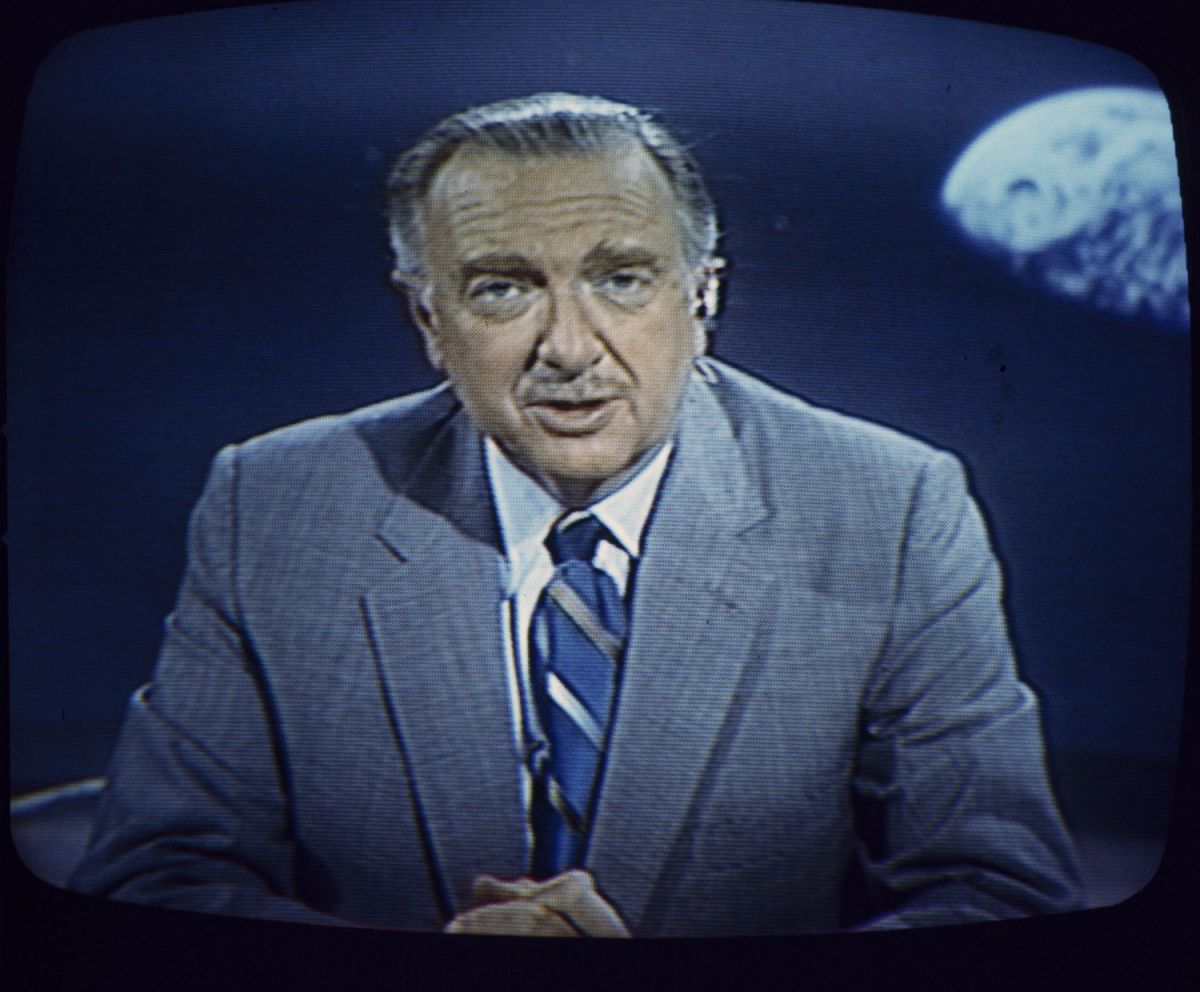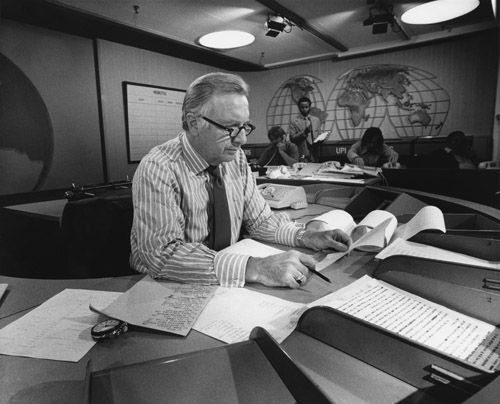Walter Cronkite and the US news media (Revisited)
By David Walsh • wsws.org
20 July 2009
THIS IS A REPOST. FIRST PUBLISHED ON 20 JULY 2009.
 Walter Cronkite, a fixture in a great many American homes as host of the CBS evening news from 1962 to 1981, died in New York City July 17 at the age of 92.
Walter Cronkite, a fixture in a great many American homes as host of the CBS evening news from 1962 to 1981, died in New York City July 17 at the age of 92.
Inevitably, a good deal of what is being said about Cronkite in the American media is self-congratulatory and self-serving. In part, the various commentators overpraise the former CBS newsman, painting him as the soul of objectivity and insight, in hopes that a little of the television networks’ former “glory,” by extension, will render the present deplorable and discredited state of broadcast journalism more attractive.
There is also no doubt a nostalgic longing within elements of the media, without the intelligence or moral capacities that would be needed to make it something more than a vague wish, for a return to a time when television reporters were looked upon, with a certain amount of justice, as individuals of substance.
The decline in the quality and seriousness of the television news programs over the past several decades has been accompanied by an astonishing drop in viewership. In 1980, the year before Cronkite gave up his evening news slot at CBS, total viewership of the evening news programs on CBS, NBC and ABC was 52.1 million, and 42.3 percent of US households tuned in to the programs.
Over the past quarter-century the number of viewers for the networks’ evening news has fallen approximately one million per year. In 2008, some 22.8 million viewers watched the programs, a decline of 53 percent since 1980. Only 15.6 percent of American households tuned in to the programs, down 61 percent in the same period. Moreover, the median age of nightly news viewers was 61.3 years for all three network newscasts in 2008.
A Gallup poll at the end of December 2008 found that for 31 percent of Americans, the Internet is now a daily news source, a 50 percent increase since 2006.
The network news programs, concoctions of superficial “sound bites,” half-truths and outright pro-government and pro-military propaganda, fully deserve their ratings crisis. The cable channels, which have gathered their own following, are no alternative, having concentrated their recruiting efforts, it would seem, on well-coiffed, but otherwise unprepared men and women quite at a loss when anything interrupts their carefully rehearsed presentations.
 Analyzing the extent to which Cronkite represented something different, and better, involves considering how the US political and media establishment as a whole has shifted in the past several decades, under conditions of the decline of American capitalism in global economic terms. Different historical periods produce different public personalities.
Analyzing the extent to which Cronkite represented something different, and better, involves considering how the US political and media establishment as a whole has shifted in the past several decades, under conditions of the decline of American capitalism in global economic terms. Different historical periods produce different public personalities.
The repudiation of New Deal or even Kennedy-like liberalism and the relentless war on the remnants of the welfare state, as well as the spelling out of—and acting upon—the doctrine of the unlimited right of American imperialism to use force wherever and whenever it likes (the so-called Bush Doctrine, pursued as well in all its important aspects by the Barack Obama administration), calls “from the vasty deep” a different sort of human type than that represented by Cronkite. Today’s anchor people, paid vast sums of money, without important knowledge or scruples, conduits for the “official story” in virtually every case, are a sorry lot.
Cronkite emerged as a reporter under different historical conditions. The son of a dentist, born in St. Joseph, Missouri on the eve of US entry into World War I, Cronkite initially pursued journalism in the middle of the Depression in Houston, Texas. After a brief stint in radio back in Missouri, he went to work for United Press (UP), the news service, becoming a World War II correspondent. Cronkite covered a number of critical battles, including the invasion of Normandy in June 1944 and the Battle of the Bulge.
After the war, significantly, he was the chief UP correspondent at the Nuremberg war crimes trials of Nazi leaders; Cronkite also served a stint as the wire service’s Moscow bureau chief.
Cronkite’s career in television, where he was truly to make his name, began in 1950, when he was invited to join CBS News by Edward R. Murrow. Prior to and during the war, Murrow gathered around him at CBS a number of talented journalists, including William L. Shirer (future author of The Rise and Fall of the Third Reich); Eric Sevareid, who had had contact with the left in Minneapolis as a student; Charles Collingwood, who would be an outspoken critic of McCarthyism; Howard K. Smith, a fixture at CBS and later ABC until the late 1970s; Richard Hottelet, another UP correspondent, who remained with CBS News for 41 years; Larry LeSueur, who wrote a book about his experiences on the Russian front, “Twelve Months That Changed the World,” and others.
On top of the desperation and upheaval of the Depression, and the New Deal, a number of these reporters experienced fascism in Europe in a personal and intimate fashion.
In 1940 Smith interviewed Hitler at his retreat in Berchtesgaden, along with Himmler and Goebbels. When he refused to include Nazi propaganda in his reports, the Gestapo seized his notes and threw him out of the country. Hottelet was arrested by the Nazis as a suspected spy at the outset of World War II, and imprisoned for four months.
These individuals went through and were marked by genuine and significant experiences. Cronkite too came of age intellectually at that time. Having reported on great events, he and the others had a certain conception of being a newsman—as an exposer of truths and big injustices—and even a capacity for moral outrage.
The narrow postwar political framework, however, within which these individuals would subsequently be obliged to operate was established early on. In 1947, Shirer, perhaps the most talented of the crowd, was forced out at CBS, without Murrow’s coming to his assistance, for criticizing the Truman Doctrine (that the US, as leader of the “free world,” must lead a worldwide crusade against communism) and the network’s kowtowing to corporate sponsors. Shirer was named in Red Channels, the anti-communist tract published in 1950, and blacklisted for all intents and purposes.
Cronkite was not of that stature. He apparently found no great difficulty in accepting the limits set by the American establishment during the Cold War. He was known to be critical, as was Murrow, of Senator Joseph McCarthy and the anti-communist witch-hunting, but he made a career for himself nonetheless.
He began doing the news for a CBS station in Washington, D.C, and by 1953 he was appearing on nationally aired public affairs programs. Cronkite narrated the first episode in the semi-documentary series You Are There in February of that year.
The program, which made use of a number of blacklisted actors and writers (including Walter Bernstein and Arnold Manoff in the latter category), as well as several future feature film directors (Sidney Lumet, John Frankenheimer and Bernard Girard), recreated famous historical events, with CBS News reporters, in modern dress, interviewing the various participants. Each program would end with Cronkite intoning, “What sort of day was it? A day like all days, filled with those events that alter and illuminate our times... and you were there.” As pompous as this may sound, the program had an undeniable gravitas.
It may be that Cronkite eventually became the anchor on the CBS evening news program precisely because he was something of a lowest common denominator. In late 1961 competition for the job emerged between Collingwood, Sevareid and “the outsider, Walter Cronkite,” journalist David Halberstam notes in his The Powers That Be (2000).
Halberstam argues that Cronkite’s “style was now more compatible with what the show needed. His roots were in the wire service, he was the embodiment of the wire-service man sprung to life, speed, simplicity, scoop, a ten-minute beat ... He came through to his friends and to his listeners alike as straight, clear, and simple, more interested in hard news than analysis. ... He looked like Middle America, there was nothing slick about his looks (he was the son of a dentist in St. Joe, Missouri, and his accent was midwestern). He was from the heartland, and people from the Midwest are considered trustworthy, they are of the soil rather than of the sidewalks, and in American mythology the soil teaches real values and the sidewalks teach shortcuts.”
Cronkite retained the anchor job at CBS for nearly twenty years, famously announcing the death of John F. Kennedy in November 1963, along with other traumatic events of those explosive decades. In February 1968, in the wake of the Tet Offensive, in which Vietnamese nationalist forces stunned the US military, Cronkite toured the southeast Asian country and on his return reported his “personal” conclusions to his viewers:
“For it seems now more certain than ever that the bloody experience of Vietnam is to end in a stalemate. This summer's almost certain standoff will either end in real give-and-take negotiations or terrible escalation; and for every means we have to escalate, the enemy can match us, and that applies to invasion of the North, the use of nuclear weapons, or the mere commitment of one hundred, or two hundred, or three hundred thousand more American troops to the battle. And with each escalation, the world comes closer to the brink of cosmic disaster. ...
“[I]t is increasingly clear to this reporter that the only rational way out then will be to negotiate, not as victors, but as an honorable people who lived up to their pledge to defend democracy, (sic) and did the best they could.”
President Lyndon Johnson is alleged to have watched the program and commented, more or less, “If I've lost Cronkite, I've lost the country.” In the midst of growing anti-war sentiment and turmoil, Johnson announced his decision not to run for another term as president on March 31.
Later, in 1968, Cronkite grew visibly angry over the brutal treatment of anti-war protesters outside the Democratic national convention in Chicago at the hands of city police and referred to the latter as “thugs.” Around this time, Cronkite was voted “the most trusted man” in America.
The technological transformation of the evening news during Cronkite’s tenure (at the time he became anchorman, the CBS evening news was a 15-minute broadcast produced in primitive conditions) and its sociological transformation into a critical instrument for shaping and manipulating public opinion on a daily basis, are subjects for a separate discussion.
Inevitably, no one in his position escapes becoming an institution, and there is no need to portray Cronkite in unduly glowing colors. He was, in the end, a figure of the liberal establishment. His oft-noted enthusiasm for the US space program (he also reported on the landing of the first man on the moon 40 years ago), while no doubt genuine, seemed motivated as well by the desire to see Americans unified around something “uplifting” in a period of discontent and strife. Still, one can also see in his excitement over space exploration a genuine belief and confidence in science and progress.
Cronkite lived through or witnessed significant and world-changing events, the Depression, fascism in Europe, the war, the McCarthyite purges, as well as the civil rights movement and the upheavals of the late 1960s and early 1970s. He clearly maintained, and this is now almost entirely lost in the American media, a democratic sensibility and a feeling for ordinary people.
In Reporting America at War (Michelle Ferrari and James Tobin, 2003), for example, Cronkite is quoted in the following manner: “I think it’s one of the reasons why news people, as a group, are inclined to be more liberal than others. They live with the common people. I’m talking about the beat reporters. This isn’t true of anchor people today or of editors sitting back in the home office. But those who are out there with the people understand a great deal more about what the average man and woman have to live through.
“I think that, in some ways, the high pay of editors and anchor people today is unfortunate, because it has removed them from the actual environment of the working man in America. In my early days as a reporter, our salaries were equivalent to a fireman’s, a policeman’s, a stock clerk’s and those were the people we drank with in the evening. Those were the people whose budget problems we understood.”
In the comments he also criticized the increasing determination of the US military to suppress the truth about its interventions. He noted that “any war situation ... is the most intimate commitment that the American government can make of its people. ... We need to know every detail about how they [US troops] are performing in our name, both when they perform well and when they perform badly. It’s most important when they perform badly, as a matter of fact. So war should be covered intimately.”
He went on: “Today we have no independent film of the [1991] Persian Gulf War—none—because our correspondents, our film crews, were not permitted to go out on the front with the troops. They should have been. The tape they shot should have been sent back to censorship. If it couldn’t be released immediately, at least it would be held for eventual release and for history. We don’t have that history now. That history is lost to us. It’s a crime against the democracy.”
The processes Cronkite refers to have qualitatively deepened and worsened. There is no news coverage worth speaking about of the neo-colonial wars in Iraq and Afghanistan, and the US media has become little more than an arm of the state and the military.
The author also recommends:
Exit NBC anchor Tom Brokaw: a nonentity in the service of wealth and power
[premium_newsticker id="211406"]

This work is licensed under a Creative Commons Attribution-NonCommercial 4.0 International License.






















People being prepared for Russia having the worlds first covid19 vaccine, the US will of course say it was stolen from them. Infantile politicians create infantile press to feed infantile articles to adult children. Critical thinking skills do not exist in the US population.
Posted by: Getald | Jul 29 2020 17:44 utc | 1